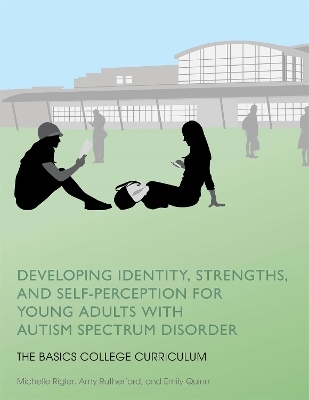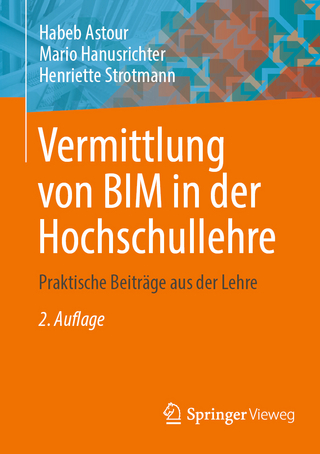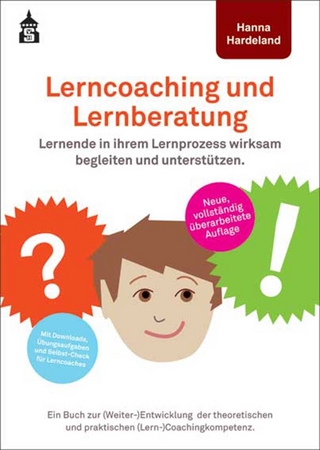
Developing Identity, Strengths, and Self-Perception for Young Adults with Autism Spectrum Disorder
Jessica Kingsley Publishers (Verlag)
978-1-84905-797-4 (ISBN)
The BASICS College Curriculum presents a hands-on approach to learning essential independence and life skills for students with Autism Spectrum Disorder (ASD). The second book helps young adults to explore their identity and self-perception and encourages them to consider their personal characteristics and strengths, to help navigate college life more easily and to provide a starting point for thinking about future careers.
Ideal as a textbook for ASD college programs and suitable for students to use for self-study, it focuses on reframing the student's perception of ASD by looking at personal experiences, the language of diagnosis, and ASD in the media and it encourages students to identify their strengths in social, group or work settings. Each chapter has a lesson-based progressive structure, providing valuable information and advice for the student, useful diagrams, practical exercises and workbook components that can be filled in at home or in class. Self-assessment tools ensure the skills from each chapter can be reviewed and adjusted as necessary.
The book can be used on its own or in conjunction with the other BASICS curriculum books to further develop essential life skills.
Michelle Rigler, EdD, is Director of the Disability Resource Center at The University of Tennessee at Chattanooga and Director of the MoSAIC Program for students with Autism Spectrum Disorder on which the BASICS Curriculum is based. Having completed a Master's Degree in Special Education and worked for a number of years as a special education teacher, she embarked on a career in Higher Education in 2004 and received a Doctorate in Education in Learning and Leadership. Amy Rutherford is Program Coordinator as well as a coach and instructor on the Disability Resource Center's MoSAIC Program for students with Autism Spectrum Disorder at the University of Tennessee at Chattanooga. She has a Master's Degree in Mental Health Counseling with a focus on Autism Spectrum Disorders. Emily Quinn is Access Coordinator for the Disability Resource Center and serves in the role of coach and instructor for the MoSAIC Program for Students with Autism Spectrum Disorder at the University of Tennessee at Chattanooga. She is currently pursuing a Master's Degree in Special Education.
Introduction. 1. Personal Stories. Lesson 1: Early Childhood. Lesson 2: Teen Years. Lesson 3: Young Adulthood. Lesson 4: Writing Your Own Story. 2. The Language of ASD. Lesson 1: Identity Models. Lesson 2: Diagnostic Language. Lesson 3: Identity Language. Lesson 4: Diagnostic Criteria and the Impact on Community. Lesson 5: Owning ASD. 3. ASD in the Media. Lesson 1: Development of Perceptions through Popular Media. Lesson 2: ASD in the News. Lesson 3: ASD in Movies and Television. Lesson 4: ASD through Social Media. 4. Identifying Your Strengths. Lesson 1: Success and ASD Qualities. Lesson 2: Identifying the Established Strengths in ASD. Lesson 3: Recognizing Your Individual Strengths. Lesson 4: Replacing Negative Self-Perceptions. Lesson 5: Reframing Your View. 5. Developing Your Core Identity. Lesson 1: Identifying What Makes You Calm, Passionate, and Anxious. Lesson 2: Developing Your Core Identity Features. Lesson 3: It is Rarely Black and White. Lesson 4: The Intersection of Your Core Identity Features. 6. Social Rules and Social Confusion. Lesson 1: Social Confusion and Establishing Purpose. Lesson 2: Rules of Social Engagement. Lesson 3: Building Your Social First Aid Kit. Lesson 4: Digging Your Way Out. 7. Building Your Team. Lesson 1: Understanding Your Preferences. Lesson 2: Recognizing the Preferences of Others. Lesson 3: Partnering Preferences to Build Teams. Lesson 4: Roles in Work Teams/Groups. 8. Changing the Goal. Lesson 1: Looking Forward. Lesson 2: Choosing the Right Academic Major. Lesson 3: The Career Continuum. Lesson 4:An Introduction to Community Service, Job Shadowing, and Internships. Lesson 5: Mentors and Career Preparation. Next Steps. Appendix A - BASICS Chart Student Example. Appendix B - Guided Discussion. References.
| Erscheint lt. Verlag | 21.6.2015 |
|---|---|
| Reihe/Serie | The BASICS College Curriculum |
| Zusatzinfo | 22 black and white |
| Verlagsort | London |
| Sprache | englisch |
| Maße | 214 x 276 mm |
| Gewicht | 580 g |
| Themenwelt | Sozialwissenschaften ► Pädagogik ► Erwachsenenbildung |
| Sozialwissenschaften ► Pädagogik ► Sonder-, Heil- und Förderpädagogik | |
| ISBN-10 | 1-84905-797-4 / 1849057974 |
| ISBN-13 | 978-1-84905-797-4 / 9781849057974 |
| Zustand | Neuware |
| Haben Sie eine Frage zum Produkt? |
aus dem Bereich


